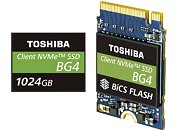Tuesday, January 8th 2019

Toshiba Memory Unveils 1TB Single Package PCIe Gen3 x4 SSD with 96-Layer 3D Flash
Toshiba Memory Corporation, the world leader in memory solutions, today announced the BG4 series, a new line-up of single package NVMe SSDs with capacities up to 1,024 GB, which places both innovative 96-layer 3D flash memory and an all-new controller into one package to deliver best-in-class read performance. The BG4 series is currently sampling to PC OEM customers in limited quantities, with general sample availability expected later in the second calendar quarter of 2019.
This new series of single package SSDs, featuring PCIe Gen 3.0 x4 lanes, offers sequential read performance up to 2,250 MB/s, and with improved flash management delivers industry-leading random read performance up to 380,000 IOPS. The BG4 single package SSDs are suitable for compact and performance-oriented systems, such as ultra-thin PC notebooks, IoT embedded systems and server boot in data centers.Additionally, the BG4 series improves upon the prior generation BG3 series in sequential and random write performance by approximately 70% and 90% respectively. Furthermore, power efficiency was improved up to 20% in read and 7% in write by utilizing Toshiba Memory's cutting-edge BiCS FLASH 3D flash memory and a new SSD controller.
The BG4 single package SSD series will be available in four capacities of 128 GB, 256 GB, 512GB, and 1,024 GB, with a slim 1.3 mm height profile for capacities up to 512 GB. Form factor options include a surface-mount M.2 1620 (16 x 20 mm) single package or a removable M.2 2230 (22 x 30 mm) module, enabling more design flexibility for thin and light mobile PCs.
The BG4 SSDs are built upon the NVM Express Revision 1.3b specification and features optional self-encrypting drive (TCG Opal version 2.01) models.
This new series of single package SSDs, featuring PCIe Gen 3.0 x4 lanes, offers sequential read performance up to 2,250 MB/s, and with improved flash management delivers industry-leading random read performance up to 380,000 IOPS. The BG4 single package SSDs are suitable for compact and performance-oriented systems, such as ultra-thin PC notebooks, IoT embedded systems and server boot in data centers.Additionally, the BG4 series improves upon the prior generation BG3 series in sequential and random write performance by approximately 70% and 90% respectively. Furthermore, power efficiency was improved up to 20% in read and 7% in write by utilizing Toshiba Memory's cutting-edge BiCS FLASH 3D flash memory and a new SSD controller.
The BG4 single package SSD series will be available in four capacities of 128 GB, 256 GB, 512GB, and 1,024 GB, with a slim 1.3 mm height profile for capacities up to 512 GB. Form factor options include a surface-mount M.2 1620 (16 x 20 mm) single package or a removable M.2 2230 (22 x 30 mm) module, enabling more design flexibility for thin and light mobile PCs.
The BG4 SSDs are built upon the NVM Express Revision 1.3b specification and features optional self-encrypting drive (TCG Opal version 2.01) models.

11 Comments on Toshiba Memory Unveils 1TB Single Package PCIe Gen3 x4 SSD with 96-Layer 3D Flash
I would say they are leading ONLY if it is 380k iops for 4k random operations at QD1, otherwise this is all a bull crap of marketing.
This also means that soon we'll have affordable 2TB full-size NVMe drives (hopefully sub-$200).